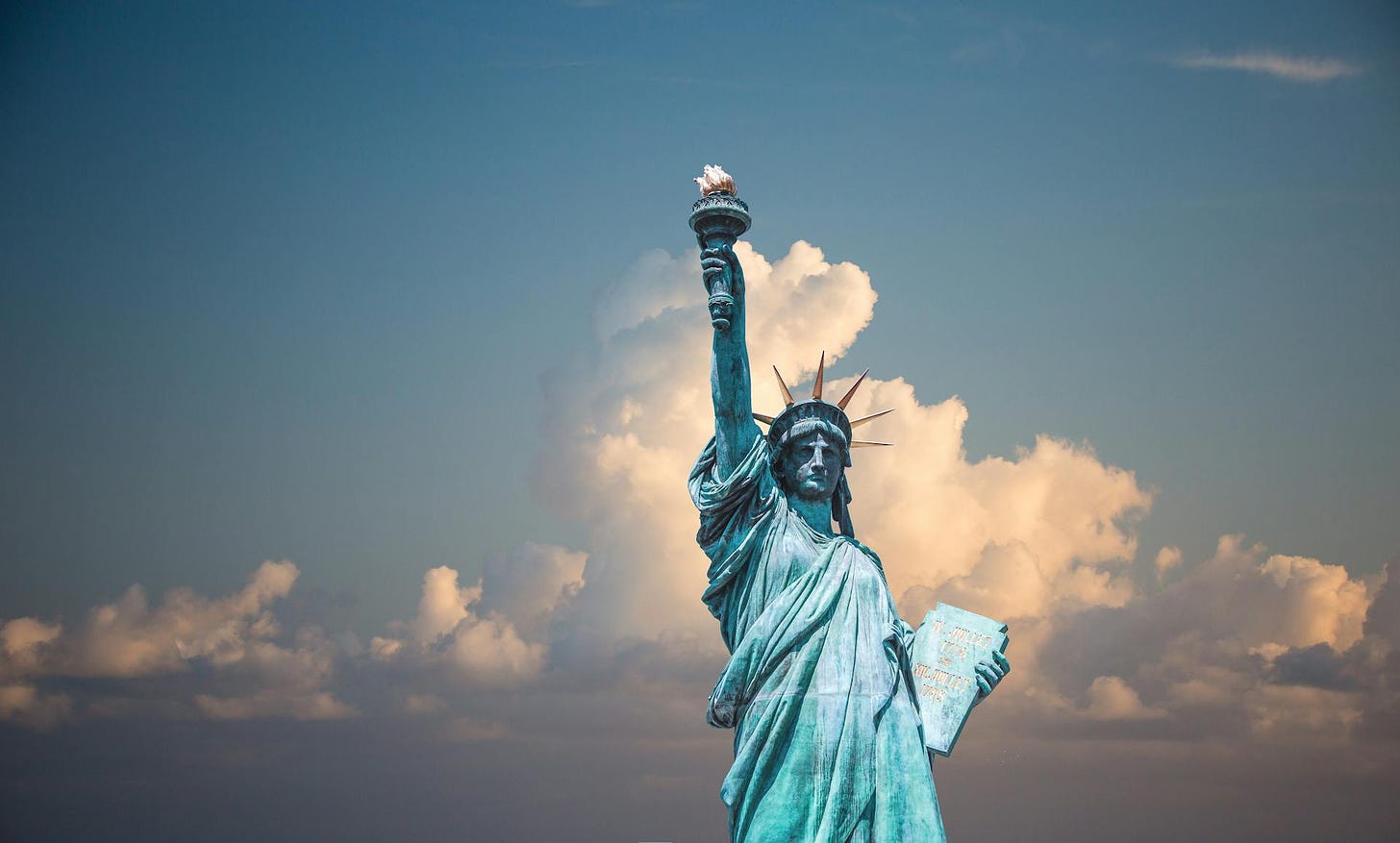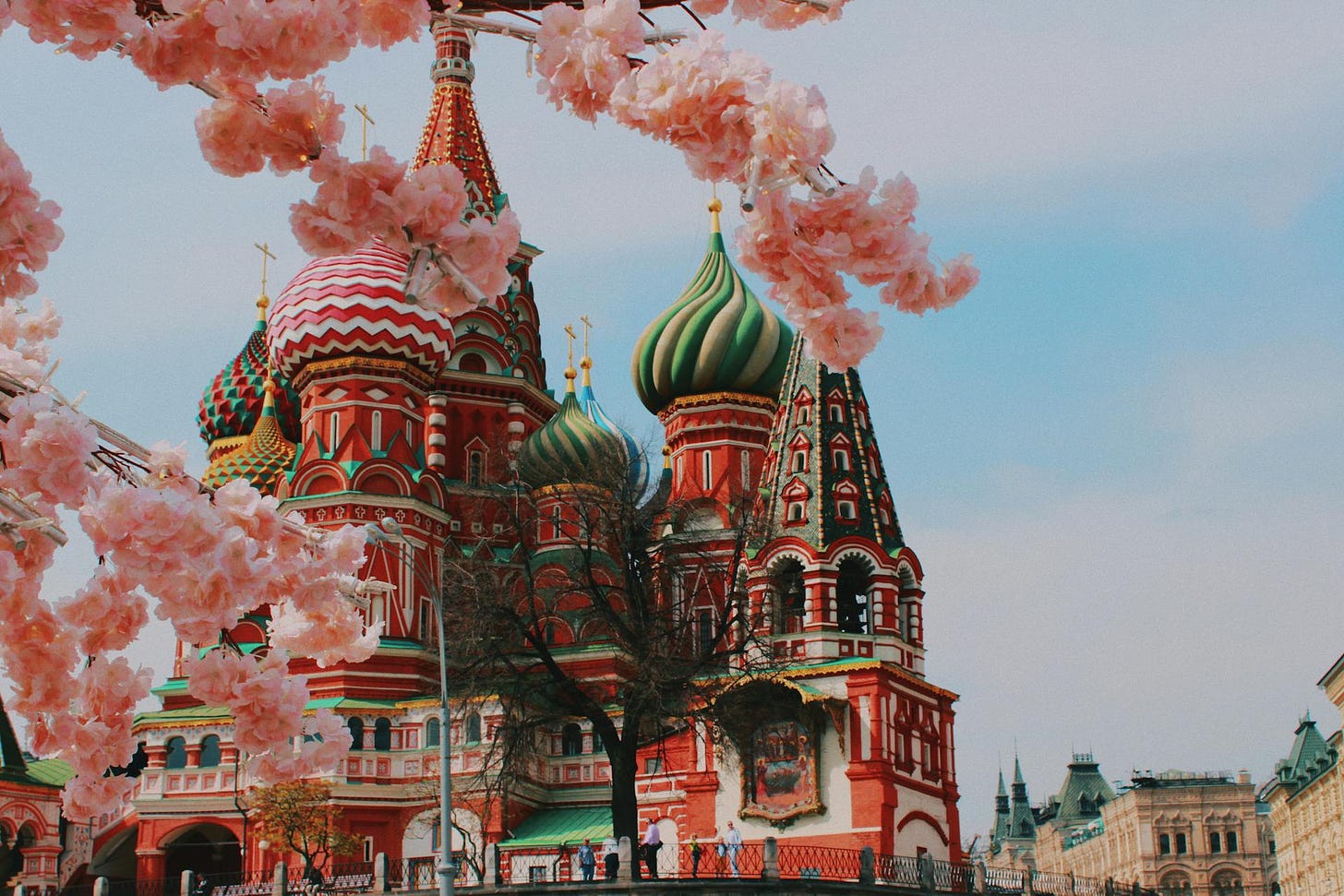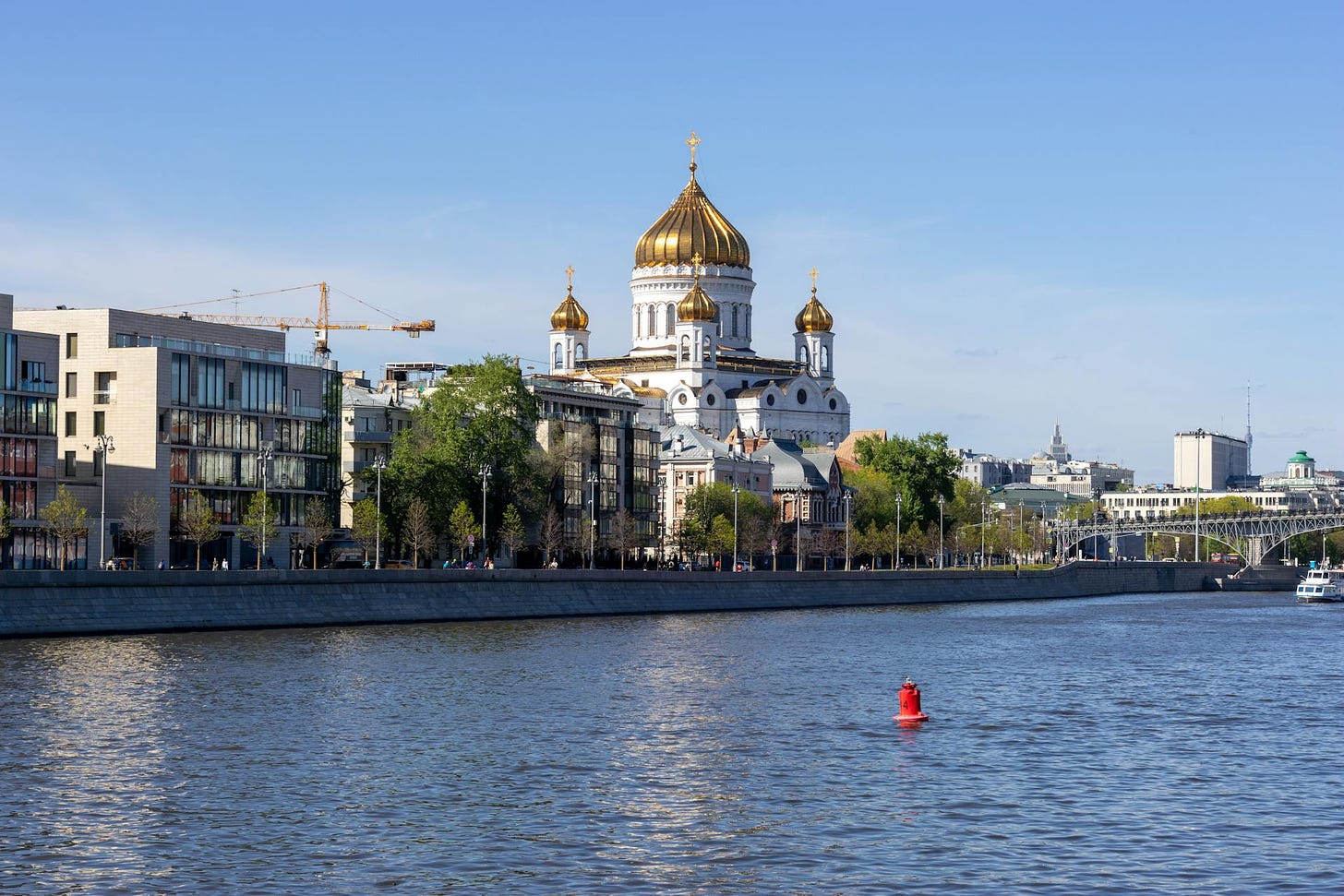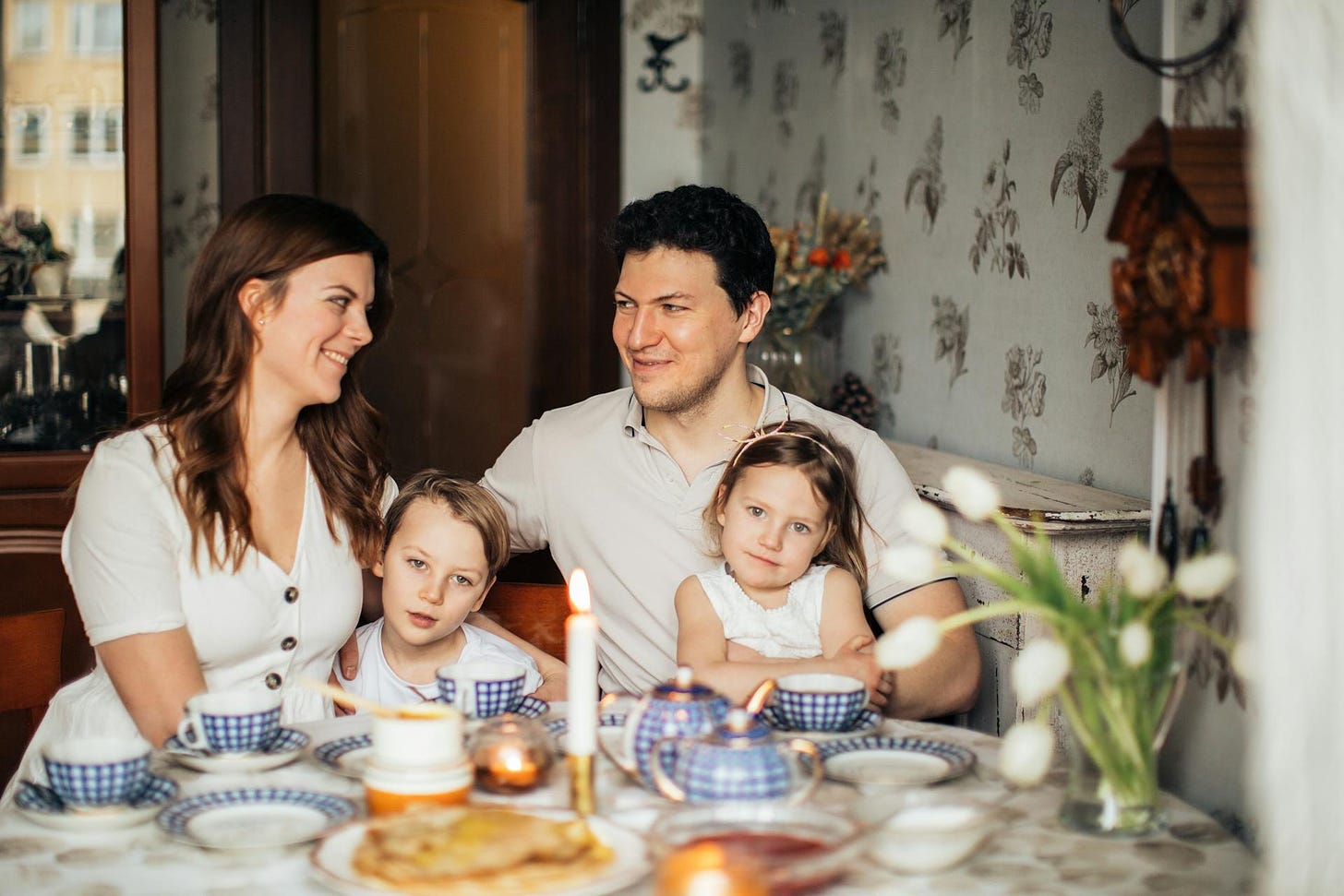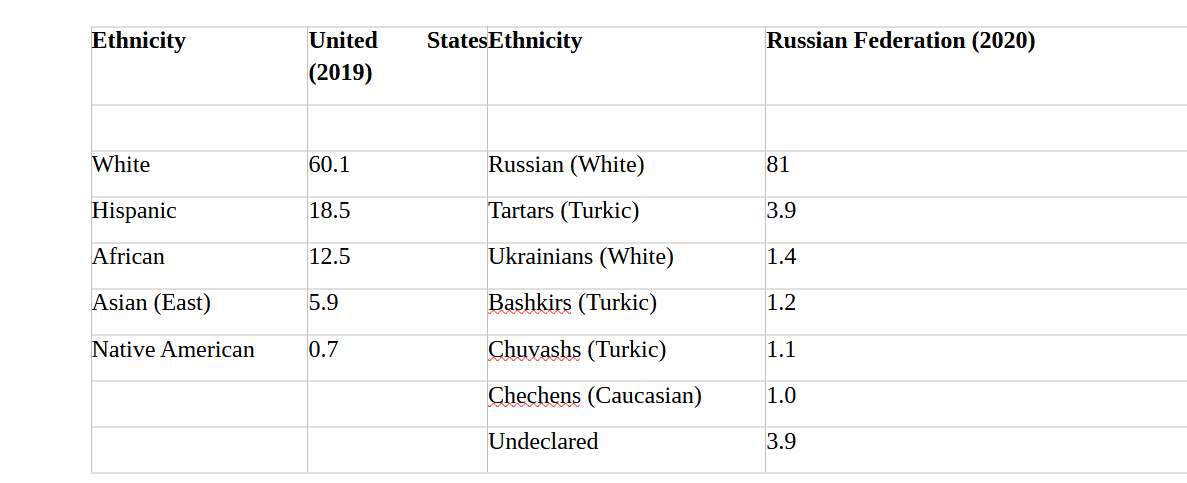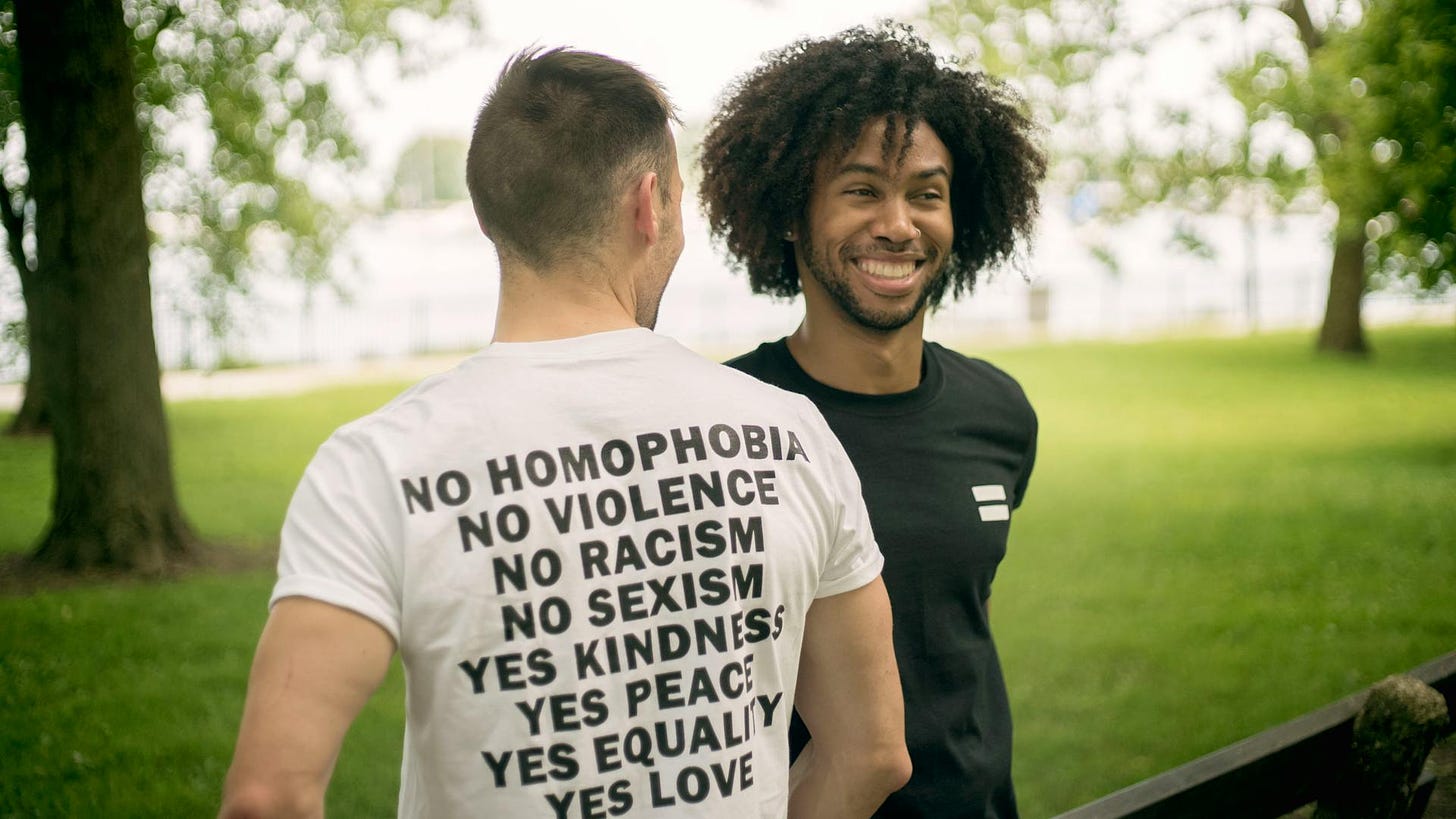Epigraph
“Becoming a modern society is about industrialization, urbanization, and rising levels of literacy, education, and wealth. The qualities that make a society Western, in contrast, are special: the classical legacy, Christianity, the separation of church and state, the rule of law, civil society.”
― Samuel P. Huntington
(Note: This essay was written before the Russian invasion of Ukraine in 2022)
Unless you are someone who is quite selective about the kind of news you consume, or is utterly cynical of geopolitics and doesn’t care about events that don’t (directly) affect your life, (good for you); in which case the conflict between Russia and ‘the West’: cultural, ideological, and more recently, potentially existential, may have passed you by.
If you’re from the United States and happened to vote in a certain way during the 2016 presidential election, where the outcome, it is believed was supposed to have been influenced by certain… entities. In this case, the reference to the Russian Federation in the political discourse that followed the election of the New York real estate mogul to the White House, exemplified by the rhetorical ‘Russia, Russia Russia’; as certain political pundits and other media commentators have referred to the alleged connection between the, then man in the White House and the once Cold War adversary of the United States.
My purpose of this essay is not to get entangled in the geopolitics that concerns the question of Russia and America and by extension, Western policy towards Eurasian nations. However given the nature of the subject, one that involves the United States and Russia, it is inevitable that these matters will arise as I attempt to answer the question: What defines the West?
It is important to note that it is not my intention to cast Russia, America or Europe (i.e. part of it that is not Russian) in a purposefully negative or positive light. Rather it is my attempt to understand the conflicts that are taking place between these nations at various levels, in various spheres, and connect them with the question of what makes the West the West.
If there is a policy position that I feel sympathetic towards, one that possibly underlies the message of this essay: it would be this: That better relations between Russia, America and Europe would be better, than no or worse relations. This point ought to be evident on the face of it. Russia is a nuclear-powered nation with a sizable military and a vast geographic presence. Whilst it is not the superpower that it was during the time of the Soviet Union, it is nonetheless a significant player regionally. Whilst it is a country that is burdened by many internal problems like a shrinking population, and a resource-reliant economy; Russia is the largest country in the world and has the largest population of any European nation.
In the course of this essay, I shall argue that despite the tendency among some intellectuals in the West to classify Russia as some alien society with values and norms that are totally different to those practised in the West; Russia in parts is quite, if not very Western. At least in a more traditional understanding of the word. Notably, because it is culturally Christian and geographically European. Points which I shall engage in greater detail in the course of this essay.
To reiterate my earlier point, this essay is not intended as a defense of Russia: its leaders, its corrupt economy, weak institutions, its record on human rights, and needless to say, its president Vladimir Putin. Hence this essay should NOT be viewed as an attempt to provide a defense or justification for the actions and ambitions of its leader, in the past, present or future. Rather this is an attempt to make sense of what Russia is, and what it is becoming: geopolitically, culturally, and spiritually, in relation to ‘the West’ and its moral and cultural trajectory.
What Makes the West, ‘The West’?
When one speaks of the ‘West’, its defining features can be understood culturally and/geographically. Those who tilt towards the secular side tend to view the West purely in geographic terms. Historian Ian Morris’s Why the West Rules for Now, is one such example. Where the author downplays the role of religion and ethnicity in determining the emergence and development of the West, with a distinct identity, according to this framework, the idea of the West is viewed minus its ethnocultural dimension.
Hence ‘the West’ as an entity is not seen from the perspective of Western culture or Western civilization, which contains the three key pillars: The Classical heritage of the Greeks, Roman law, and the Christian spiritual heritage. When the West is viewed in these terms, as a cultural entity, the idea of what constitutes the West expands. In that nation-states and peoples who embrace value systems and norms that connect them with the West at a deeper cultural, moral, and spiritual level can also be considered ‘Western’.
Notable here is the Christian faith. Christianity has traditionally, and for the most part is still, associated with the West proper: that is the ‘West’ in a geographic sense. An association that many of us affirm. Christianity, despite its emergence in the Levant (Western Asia) first took root, and evolved to its fullest form in Europe and surrounding regions, and was then exported to all corners of the world through conquest and colonization.
Since Christianity established its first cultural home (outside its nation of founding) in regions that are geographically part of the West (beginning with Rome). It naturally took on a very Western or European character in a geographic sense. As Christianity as a belief system expanded and spread across the world, its growth went hand in hand with the expansion of European or ‘Western’ culture: This meant that in addition to religious belief, it also included the export of language, legal codes, and later technical expertise, and critically people (i.e. Europeans). Whose entry accelerated the Westernization of these regions.
A notable example here is the Americas. Where both North and South America were not only colonized by Europeans (who represented the designs of kings and emperors of their native homelands). But colonization also meant the Europeanization of the region through a steady influx of Caucasian immigrants. Who went on to play an influential role in the social and political development of their societies. Simón Bolívar, known as the liberator, played a key role in the independence of states from Spain in South America, though he himself was of Spanish descent.
The emergence of North American nation-states was a product of European exploration and settlement. The Founding Fathers of America were all of European descent; Canada was a Crown Colony, and today is a Commonwealth Realm. The point is, that parts of the world where Christianity gained a foothold can be traced back to the adventures of Europeans; specifically European Christians (because back then virtually everyone was religious) in those respective lands. And the lands where European Christians took hold and established themselves, today constitute the West, despite the cultural and ethnic pre-history of those lands being somewhat different (e.g. pre-colonial Australia).
Speaking of the geographical West today: North America, Western Europe, Oceania, South, and Central America, are regions that are fast losing their religious, but specifically Christian character. The rise in the irreligious, the growth in secularism, agnosticism, and notably the phenomenon of NONES are all predominantly Western in their character. But not Russian. As we shall see, the Slavic country, in a somewhat contradictory sense, has started to move in the opposite direction, towards the religious.
On the other hand, parts of Sub-Saharan Africa and Asia, which despite having sizable Christian populations are not considered to be under the Western orbit. This is mainly due to their ethnic character. A point that is generally avoided in discussions surrounding ‘Western’ nations. Then there is the economic dimension, which is largely tied to the political system of the nation. The prevalence of a functioning market system tends to go hand in hand with republican or representative governments. The counterpoint point is that Communist regimes like North Korea and Cuba; whose socialist economies are lorded over by a dictatorial political class.
Staying on the relationship between economics and politics, as countries move closer to authoritarianism, they tend to manifest stronger economically collectivist or ‘extractive’ tendencies. This point is reinforced in the book Why Nations Fail: The Origins of Power, Prosperity, and Poverty by Daron Acemoglu and James Robinson. Where the ruling political class, which invariably takes the form of some one-party dictatorship, built on nepotism and cronyism, exploits the masses in a kleptocratic framework of governance.
Almost all countries that are in the Western hemisphere tend to feature elected governments that operate according to market principles. More or less anyway. Interestingly countries with large Christian populations found in parts of Africa are notorious for their bad governance, weak economies, dilapidated infrastructure, corrupt institutions, and social instability; and are not considered to be Western despite their religious connection with the West. In this context ethnicity and socio-economic systems seem to matter more when it comes to the question of what constitutes the West. For countries in Latin America, notable examples here are Brazil and Colombia, which are much closer to the West (i.e. via economic and security ties with the United States).
An argument can be made here that both Brazil and Colombia and a number of other South and Central American countries that have sizable European populations or people who have an ethnic European heritage (mestizo) are able to connect better with the idea of ‘the West’, owing to the shared racial heritage.
Russia on the other hand is an outlier in this regard. In that its political system is considered to be antithetical to what the West stands for: Democracy along with its economy, which tends to be oligarchic. Russia, despite being a majority-ethnic European polity like most Western nations, due to its economy, one that is not the most open with the heavy hand of the state, the dominance of Kremlin-connected oligarchs and widespread cronyism, is distrusted by ‘the West’.
Finally, there is the question of history, which is closely tied to that of culture. Since Russia is a country that was on the opposite side of the Cold War, it is still viewed as an advisory in certain quarters of the Western intelligentsia. Especially among old-school (pre-Trump) conservatives, and foreign policy hawks in the neocon establishment in the Anglo-American world. Since Russia was an adversary then, it is likely to be an adversary now. And in the case of Mr Putin, as a former KGB officer, the fear in certain Western quarters is that he harbors the vision of reconstituting the Soviet Union; a point that is repeated often in recent times. Though the Soviet Union, the predecessor of modern Russia was an allied nation in WWII, contributing greatly to the defeat of the Third Reich.
This is where things become interestingly complicated. Russia is a large country with a lot of nuclear weapons. A country that has invaded neighboring states from time to time: Georgia, Chechnya and Ukraine notably. And is routinely accused of cyber warfare against Western nation-states. So fears regarding its geopolitical ambitions, at least in regional terms, are justified. However, when it comes to the cultural connection with the West, Russia’s position is an interesting one.
Russia is a country with a communist past. A rather painful one where leftist ideologies like atheism, collectivism, and feminism prevailed. Whereas today it is a society that is evolving in a different direction. One could say in a more ‘conservative’ direction. And paradoxically this is where problems start to emerge. Geopolitical questions aside, Russia’s biggest ‘crime’ today, one that has possibly contributed to ‘the West’ (at least certain influential segments that determine its policy) to view Russia as public enemy No. 01 has been the cultural shift that has been taking place inside, in what once the core of the ‘Evil Empire’.
Russia: A Nation that is Western for the Wrong Reasons
When one speaks of Russia, it is a nation that tends to provoke an instinctive negative reaction among vast segments of the Western intelligentsia. (Another word that is arguably more suitable here is ‘liberal elite’ but that would sound too partisan). Besides its historical role as the one-time ideological adversary during the Cold War: where Russia was at the heart of the Communist sphere that was opposed to the capitalist, democratic West. Russia is still viewed with suspicion by many in the West for its rejection of certain socio-cultural norms (or agendas) that have pervaded the West. Notably on issues like gender, and sexuality.
The democratic West or ‘the free world’ today, is best embodied by the consumerist United States. Following the end of the Cold War and the apparent ‘End of History’: where the ideological struggle over the most effective political system to govern modern polities had seemingly come to an end with the fall of the Berlin Wall and German reunification. A time when communist China and the Islamic world were still minor players. With the apparent victory for liberal democracy, Russia as a serious rival to what the West embodied ideologically and culturally: in economics, governance, and social norms was considerably weakened, to a point where it posed no serious challenge to ‘the West’.
Ironically it is what happened afterwards, notably the steps the Russians took to become, not exactly like the West, but as a way to distance themselves from their nation’s communist and atheistic past. One that ironically mirrors the ‘West’s’ own move away, deliberately or otherwise, from what used to define its social and cultural identity. Christianity, the heritage of Graeco-Roman civilization, and traditional family.
In other words, Russia today is more like, or at least it seems to be becoming like what the West used to be some decades ago. A shift that appears to underlie the West’s apparent antipathy towards Russia. This is most evident in two key areas which I have touched on that require elaboration at the level of policy, that is taking place within the Eurasian nation.
Russia is Christian
The West today is mainly represented by English-speaking countries that have an Anglo-Celtic heritage along with Western Europe that consists of predominantly non-Slavic nations with exception of Poland. The latter despite being culturally conservative (unlike many Western European nations) despises Russia. The nations that constitute the West are united for the most part in terms of values, beliefs, and social character, but the key feature is the integrated nature of their economies. With the religious character featured as a less significant variable.
One of the key foundations of norms and values of a society is its religious heritage. So it is interesting to note that the West proper (excluding Russia, and the majority-Christian countries around the world that are not ethnically European) are regions that are fast losing their Christian character. Notable here are Anglo-American countries and much of Western Europe (which includes Northern and Southern European countries) which are not only secularizing, but the peoples, particularly the younger generation are embracing secular ideologies and atheistic belief systems en mass. The growing prominence of gender and gender identity and the social movements that represent them are symptomatic of the decline in traditional institutional faith.
The idea of being a feminist, or a person who fights for social justice, racial equality, or immigrant rights has come to be the defining belief for many. This in turn has led to a further shift away from traditional values and beliefs: Such as heteronormativity, femininity, masculinity, gender polarity, and traditional family. The affirmation of these is naturally viewed as an affront to feminism, homosexuality, LGBTQ rights, and in recent times the rise in post-colonial narratives, which in practice are overwhelmingly anti-European in their orientation.
Interestingly Russia in recent times seems to be going in the opposite direction, its growing affirmation of traditional or what could be considered as Christian values. Most notable here is its approach towards abortion: arguably the most central issue that governs the modern feminist and by extension leftist discourse. Abortion rates have historically been very high in the Russian Federation, a practice that continued from the Soviet era. But under Mr. Putin, policies that advance a pro-life (or anti-abortion) position have grown in strength. Measures aimed to protect the sanctity of life, rather than a woman’s right to choose, are increasingly advanced.
And at a time when Churches and parishes are being closed at a record rate in the West, Russia is one of the few Western (and European) countries that is actually building them. Which follows the increasingly cozier relationship between the Russian president and Patriarch Kirill. Mr. Putin either sincerely or as a PR strategy, is now seen actively engaging in religious rituals, making pilgrimages to the Holy Land, and showing his spiritual persona, seemingly putting himself forward as a leader who is willing to stand up for Christian and by extension ‘Western’ values. Which is a far cry from anything that can be said about any other Western leader or diplomat in relation to the subject of Christianity.
Then there is the social policy aspect. Mr Putin’s pro-life position and defense of traditional values is one that goes hand in hand with the apparent aim to revive Russia as a culture and as a people. Notable here is his pro-child policy. The Russian president has bravely taken on the challenge of confronting Russia’s demographic problem which, like the rest of Europe is dire.
It is ‘brave’ in the sense that the traditional (i.e. Western) response to declining demographics among the native European populace has been to encourage immigration. Usually people from developing countries where the people are often neither Christian nor European. Not so with the Russians, who seem to prefer doing things the old-fashioned way. Interestingly enough so does another group at the policy level. The AFD in Germany. Which is a topic for another time.
In sum, Russia is a country, possibly due to its communist, atheist past, and is now trying to rediscover, or better rekindle its religious (i.e. Christian) heritage. A reality that apparently does not sit well with many in the West. Western foreign policy today is represented by the worldviews of the ‘coastal elite’, the ‘Washington swamp’, or liberal (leftist) intelligentsia (take your pick). Groups who view Christianity as a remnant of the West’s (bigoted) past, and instead wish to advance the ‘inclusive’, the ‘diverse’, the ‘equal’.
All of these moves, either directly or as a side effect work against the European character of the West. A notable point here is the practice of tearing down statues of prominent individuals (all ethnically European) in many Western countries. Whilst such movements are often instigated by a self-righteous mob mentality, the fact that Western governments are tolerating such practices is a reason for pause.
The latest is the removal of the statue of U.S. President Theodore Roosevelt from the Museum of Natural History. Such activism is often justified in the name of fighting the bigotry and racism of the past embodied by these figures. Whilst these men were far from perfect, they nonetheless represent the heritage of Western Culture. For it is their efforts that gave rise to what the West has become.
So the question is, if these men are to be removed from halls of Western society owing to their moral failing, which are placed higher than their works and achievements, it raises questions on the nature of their contributions as a whole: That is the edifice of Western culture. You see, if the men who built Western Civilization are bad in sum, that can only mean that Western culture, which is a fundamentally European project, is also bad. This means, quite logically, that anything that is characteristically European, either by heritage or association is also bad.
Russia is European
The West, speaking of the Anglo-American world: United States, Canada, Australia, New Zealand and even their mother country Great Britain are now increasingly viewed by many in the West, as products of colonialism, slavery, pillage, and exploitation. Specifically, it is the exploitation by the European or White Man of the rest of humanity. In recent years these politically correct or “woke” narratives have gained prominence within the halls of power.
Notably, in the Anglo-American sphere where these woke, or essentially anti-Western views, are characterized by their unmistakably anti-European and necessarily anti-Christian orientation. Such narratives have not only gained strength in the West, speaking of higher academia but are increasingly becoming the norm at the level of culture. The removal of prominent Western thinkers and intellectuals like William Shakespeare from the curriculum of a number of prominent Western academic institutions, or at least the growing activism to do so is a sign.
A reality that was first brought to light in 2013, in my second year at the University of Greenwich London. When an English girl who was about to graduate with a BA in Drama told me that in the course of her degree she had zero content on the Bard of Avon. Which came as a shock. Things are much worse now, as the calls for the removal of Shakespeare and other notable Western thinkers have only increased.
Bizarrely this is taking place even in the scientific arena. Prominent figures such as Sir Issac Newton face ‘cancellation’ owing to his association with colonialism. Marry this with the ever-growing calls for the need to increase ‘diversity and inclusivity’ in academics and beyond, all of which come at the price of excluding or marginalizing Europeans, particularly those who are male. In other words it seems that the West is increasingly becoming a hostile place for White, Western men.
Taking a step back from the underlying ideological motivations driving such calls to increase the representation of ethnic minorities in the public sphere, at a deeper level such shifts, are increasingly a reflection of the actual state of Western society. Notably the countries in North America and to a lesser extent Britain. One of the notable features of the West in recent decades has been its demographic decline.
Virtually all major Western nations in Europe and North America have a birthrate that is below the replacement level of 2.1 births per woman. Interestingly this also applies to nations like Japan and Korea, which are technically Western countries, in that they are under America’s security umbrella, with developed market economies; but these nations are neither Christian nor European. At least not in a significant way, and their cultures reflect this difference (e.g. immigration policy in Japan, which by Western standards is borderline xenophobic).
In the meantime, population growth in many of these Western countries has been driven by immigration. Immigration of people predominantly from developing countries in Asia and Africa, who needless to say are ethnically non-European. Over the years immigration of non-Europeans into the West has increased, and along with it the continuity of low or declining birthrates among the natives of Western nations. Here is a breakdown of the ethnic character of the United States and Russia.
According to Brookings, in the decade between 2010- 2019, the total U.S. population grew by 19.5 million. However during this time, the While or ethnic European American population declined by a fraction of a per cent; with growth in total numbers seen for the Latin or Hispanic, Asian American, and African populations; along with growth for the Native American population. What is interesting is that if you add all of it up, America’s European population as a percentage of the total went down from 69.0 per cent in 2010, to around 60.0 in less than a decade, almost a ten per cent drop!
So what do we have here? The United States which is the largest (economically and demographically) and the most powerful Western nation is losing its European character visa vie the decline of its European populace. This decline needs to be seen in the light of the backslid the West (again led by the United States) is facing in the light of the weakening of its Christian heritage, and the increasing attacks on the intellectual foundations of the West. With such developments taking place at the highest levels of academia.
Where the marginalization of the names and in time the works of the great minds that defined the West’s accomplishments, who are, as we speak being blacklisted and removed from the Halls of the very institutions that many helped build. Actions justified by their apparent association with colonialism, racism, white supremacy or whatever rhetoric that is used to justify such actions. Essentially what we are also witnessing is the growing marginalization of Europeans as a people in academics and increasingly popular culture, purely on the basis of their ethnicity.
Russia, needless to say, is not going to be a hotbed for critical race theory, intersectional feminism or a place where diversity and inclusivity quotas are going to be enacted to the detriment of its native European (White) population. And if the treatment of Pussy Riot is anything to go by, along with Mr. Putin’s newfound Christian sensibility, Russia seems like a nation where cultural conservatism (though a more aggressive one) is set to thrive.
A nation that is moving away from its Soviet communist path that was characterized by atheism, extreme egalitarianism, and feminism. So when one marries Mr Putin’s population policy with his cultural embrace of Russia’s Orthodox (Christian) heritage it seems that Russia seems to be, or at least it seems to become a Western nation in its own right. But not the type of Western nation that ‘the West’ (in its current secular state) desires.
The West is no longer Western
During my time in England, I soon recognized the difference between Europeans from the West: that is America, Western Europe, and Great Britain vs Europeans from the East: notably from Slavic cultures. One way to understand the divide is to engage the topic of gender. People from Eastern European cultures: countries which are close to Russia, or that were formerly part of the Soviet Union and/or who have a Slavic ethnic and cultural heritage, is that they tend to value or subconsciously affirm what could be understood as traditional gender roles.
Persons of Slavic heritage, immigrants, who I got to know and in some cases befriended tended to view women from the West (i.e. English speaking countries) as less desirable. Not in just a physical sense, but in terms of their attitude and character. This is a view that transcends ethnic (European) lines and applies even to men from the non-Slavic West.
For example, a woman of Slavic heritage raised in Britain rather than in an Eastern European country would score differently in terms of her desirability, if the background was reversed. A Serbian friend of mine pointed out that in his culture, despite the onset of modernity, traditional gender roles were still valued. Notably the polarity between the masculine and the feminine, as realities that are tethered to biology. (Though he expressed this point a bit differently). Further, as I have learned, many men in Western countries do seem to prefer women of ‘Eastern’ heritage, when it comes to the question of picking a partner or finding women who are pretty and feminine. A reality that has started to affect the dating arena.
Insights from the Dating World
To sidetrack a little bit. During an interesting back-and-forth between the presenter Pierce Morgan and a British dating coach Richard La Ruina in 2017 on the nature of modern British women when it comes to relationships; the coach whose mother is British, recommends that British (and by extension Western European) men ought to go East (towards Russia) in search of more suitable or desirable partners, owing to their more delicate, lady-like character. The coach went on to describe British women as “.. entitled, overweight and less feminine”.
Now the term ‘Eastern’ need not solely mean Eastern European. As the growing trend of Western men seeking partners and wives in places like Thailand, and Vietnam is worth mentioning in this context. The point is Eastern European women: women who are from Slavic cultures, and countries closer to Russia are deemed to be more desirable by Western men due to their more traditional (less-feminist) outlook on life. And this I would conjecture is a growing phenomenon.
La Ruina’s point on the growing distaste Western men have towards less feminine women who seemingly predominate the Anglo-American world is noteworthy. What it implies is the underlying unease and potential distaste Westerners have towards feminism. This would naturally affect their dating (and mating) preferences since women in the West are generally feminist in outlook.
On a darker note, the demand for Russian (non-feminist) women is quite high in the West and there has emerged something of an industry that involves the ‘trade’ of Russian women. And I am not just talking about hookers and high-class call girls. More research is required here but there is what appears to be a growing industry involving the trade of Russian ‘wives’.
And it is not just Russian (or Slavic) women that ‘the West’ has its sights on. Until its banning in 2012 by President Putin, American families adopted around 1000 Russian children per year. Whatever the reasons that may have motivated the Russian government to impose the ban, what is notable is the American (or Western) desire for Russians (i.e. Europeans). So to simplify things a bit, if men in the West like banging Russian women and adopting their children, shouldn’t closer relations with the Eurasian nation logically follow?
It seems that for many in the West, Russia and what the non-Westernized parts of Europe represent culturally are increasingly more desirable. The antipathy towards feminism appears to go hand in hand with the affirmation of traditional masculinity which is valued more in Eastern European cultures. One that is most embodied by Mr. Putin himself. Here I recall in 2012, when the Russian elections had just concluded, and two European friends of mine were discussing the outcome.
My British friend expressed the somewhat typical reservations that many in the West have towards Mr Putin’s Russia. Notably the fear of growing consolidation of power under one man. My Hungarian friend on the other hand (Hungary by the way is not a Slavic country) Googled some images of Mr Putin doing his traditional macho stuff (horseback riding, hunting, going shirtless etc). Which he argued validated his position to lead Russia.
In other words, there seems to be a break in the idea of what constitutes the West. A geographically western nation, with a market system containing multi-ethnic but still predominantly European populations versus those who have Christian character but non-European populations versus those with a dominant Christian and European population but who view themselves as Europeans first, and are increasingly skeptical of the declining European and Christian character of the West. Countries like Hungary are a case in point.
As mentioned earlier, the removal of historical monuments and statues of great leaders and statesmen of the past (all of whom are European or White) for their association with colonialism, slavery, etc. Is telling for more deeper more problematic reasons. This combined with collapsing demographics in the West, one that appears to be driven mainly by the decline in the ethnic European population only fuels the fire.
Such changes, I would argue would push large segments in the West, as nation-states and as people within nation-states (e.g. pro-Russia factions in Britain, Germany, France and even the United States) which are looking towards Russia in a more positive light. Owing to its more traditionally Western character, one that is increasingly based on its Christian and European character. Which ‘Mother Russia’ is willing to embrace. The very things that the West proper, notably the United States is not only losing but appears to be working purposefully to dismantle.
(Note: This essay was written before the Russian invasion of Ukraine in 2022)




